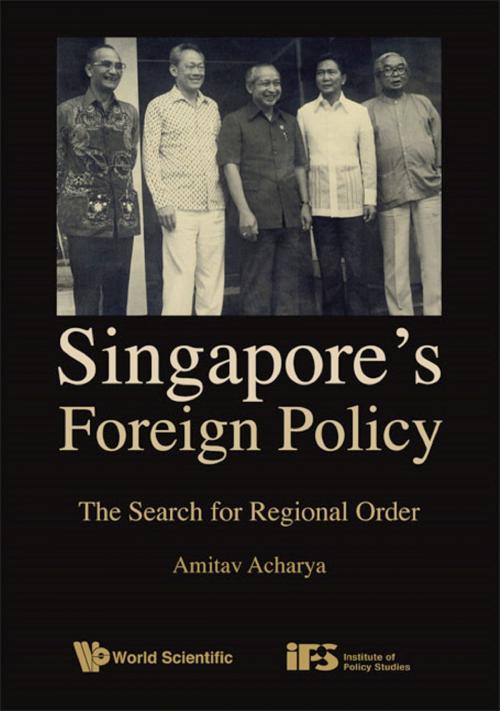Singapore's Foreign Policy
The Search for Regional Order
Nonfiction, Social & Cultural Studies, Political Science, Government, Public Policy, International, International Relations| Author: | Amitav Acharya | ISBN: | 9789814474733 |
| Publisher: | World Scientific Publishing Company | Publication: | November 26, 2007 |
| Imprint: | WSPC/IPS | Language: | English |
| Author: | Amitav Acharya |
| ISBN: | 9789814474733 |
| Publisher: | World Scientific Publishing Company |
| Publication: | November 26, 2007 |
| Imprint: | WSPC/IPS |
| Language: | English |
The conventional understanding of Singapore's foreign policy can be summarized in three main propositions: first, it is dictated by the imperatives of being a small state; second, its primary purpose is to ensure Singapore's survival, given its small size; and third, this logic of survival dictates a realpolitik approach to foreign policy and national security.
This book argues that an exclusively realist view of Singapore's foreign policy is inadequate. Singapore's foreign policy is also shaped by the positive effects of economic interdependence and regional institution-building — instruments that realists tend to dismiss, but which Singapore has self-consciously tried to promote as instruments of regional order. The book first looks at the evolution of Singapore's foreign policy, before analyzing Singapore's international relations and national security in the context of economic growth and terrorism. It concludes with an interesting chapter on the impact of the rise of China and India on the regional landscape.
Contents:
-
Introduction: Rethinking Singapore's Foreign Policy
-
Part I: Foundations:
- The Evolution of Singapore's Foreign Policy: Challenges of Change
- The Economic Foundations of Singapore's Security: From Globalism to Regionalism?
-
Part II: Adaptations:
- Diplomacy in Hard Times: Singapore Confronts Global Terrorism and Regional Regression
- Waging the War on Terror: Singapore's Responses and Dilemmas
- Singapore and Southeast Asia in a Fast-changing Landscape: Coping with the Rise of China and India
Readership: Undergraduates, graduates and academics in foreign policy and international relations; government ministries; general readers interested in Singapore issues.
Key Features:
- Challenges the conventional realist understanding of Singapore's foreign policy in favor of a liberal institutionalist and social constructivist approach
- Contains a collection of essays written between 1992 and 2005, thus providing a picture of the evolution of Singapore's foreign policy
- Covers topics such as the linkage between economics and national security; globalization versus regionalization; terrorism; regional, inter-regional and bilateral cooperation; and the impact of the rise of China and India
- Includes past speeches by Lee Kuan Yew, S Rajaratnam, S Dhanabalan and Tommy Koh on foreign policy
The conventional understanding of Singapore's foreign policy can be summarized in three main propositions: first, it is dictated by the imperatives of being a small state; second, its primary purpose is to ensure Singapore's survival, given its small size; and third, this logic of survival dictates a realpolitik approach to foreign policy and national security.
This book argues that an exclusively realist view of Singapore's foreign policy is inadequate. Singapore's foreign policy is also shaped by the positive effects of economic interdependence and regional institution-building — instruments that realists tend to dismiss, but which Singapore has self-consciously tried to promote as instruments of regional order. The book first looks at the evolution of Singapore's foreign policy, before analyzing Singapore's international relations and national security in the context of economic growth and terrorism. It concludes with an interesting chapter on the impact of the rise of China and India on the regional landscape.
Contents:
-
Introduction: Rethinking Singapore's Foreign Policy
-
Part I: Foundations:
- The Evolution of Singapore's Foreign Policy: Challenges of Change
- The Economic Foundations of Singapore's Security: From Globalism to Regionalism?
-
Part II: Adaptations:
- Diplomacy in Hard Times: Singapore Confronts Global Terrorism and Regional Regression
- Waging the War on Terror: Singapore's Responses and Dilemmas
- Singapore and Southeast Asia in a Fast-changing Landscape: Coping with the Rise of China and India
Readership: Undergraduates, graduates and academics in foreign policy and international relations; government ministries; general readers interested in Singapore issues.
Key Features:
- Challenges the conventional realist understanding of Singapore's foreign policy in favor of a liberal institutionalist and social constructivist approach
- Contains a collection of essays written between 1992 and 2005, thus providing a picture of the evolution of Singapore's foreign policy
- Covers topics such as the linkage between economics and national security; globalization versus regionalization; terrorism; regional, inter-regional and bilateral cooperation; and the impact of the rise of China and India
- Includes past speeches by Lee Kuan Yew, S Rajaratnam, S Dhanabalan and Tommy Koh on foreign policy















